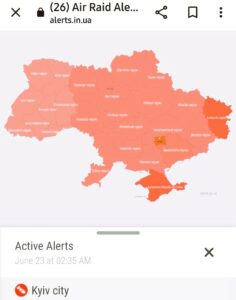EUROMIL’s Working Visit To Kyiv: 21 – 24 June
Looking back in time
The good relationship between Ukraine and EUROMIL goes back a long way in time. We should, for example, remind that until 2014, EUROMIL didn’t only count a member association from Ukraine among its members, but also from Russia. On many occasions, EUROMIL visited both of them in their home countries and joined them in conferences.
Unfortunately, meanwhile, the situation changed drastically. In December 2013, due to the so-called Euromaidan protests, EUROMIL sent out a statement that was reading as follows: “EUROMIL is concerned about the situation in Ukraine which drastically changed in the past weeks. Through peaceful demonstrations and actions, the Ukrainian people want to raise its voice and express its wish for a new dialogue between Ukraine and the European Union. EUROMIL is aware that Ukrainian military personnel are not allowed to participate in (political) demonstrations. However, we are also informed that they support the European choice of the people of Ukraine. EUROMIL calls on all parties not to use force to demonstrate their opinion or as a reaction to these public demonstrations. EUROMIL especially calls on the Ukrainian government not to use its armed forces against unarmed demonstrators and fellow citizens but to start a dialogue with all the parties involved and bring in a peaceful way an end to this crisis. EUROMIL demands that the human rights and fundamental freedoms, such as the freedom of expression and freedom of assembly, of the Ukraine people are fully respected by the Government.”
However, the protests continued, and the Maidan Revolution came to a climax in February 2014. At the end of the Euromaidan protests, deadly clashes between protesters and state forces in the capital Kyiv culminated in the ousting of President Viktor Yanukovych and a return to the 2004 Constitution. Yanukovych claimed that the vote on 22 February 2014 to remove him from office was illegal, and he asked Russia for help. Russia condemned the events as a “coup”. Pro-Russian counter-revolutionary protests erupted in southern and eastern Ukraine. Russia occupied and then annexed Crimea, while the armed pro-Russian separatists seized government buildings and proclaimed the independent states of Donetsk and Luhansk, sparking the Donbas war.
Therefore, it should be clear that the current war, even if called a “special military operation” by Russia’s President Vladimir Putin, didn’t start on 24 February 2022, but eight years earlier. In April 2022, EUROMIL’s Board stated that “a quick and peaceful solution based on diplomatic talks and decisions is urgently needed. EUROMIL calls for negotiations, immediate ceasefire and respect of international law and norms.” Almost 1,5 years later, the impact of this war is huge. The humanitarian impact of the invasion has been extensive and has included negative impacts on international food supplies. The Russian invasion also had a negative impact on the cultural heritage of Ukraine, and Ukraine’s Minister of Culture called it a cultural genocide. Besides, the war caused the largest refugee and humanitarian crisis within Europe since the Yugoslav Wars in the ‘90s. The UN described it as the fastest-growing refugee crisis since World War II. But also, the environmental damage should not be forgotten. The targeting of industrial and energy infrastructure caused severe pollution, and the use of explosive weapons has left millions of tons of contaminated debris in parts of Ukraine. Most recently, the Kakhovka Dam, under Russian occupation, was damaged and caused flooding and triggering warnings of an ecological disaster.
As already said, EUROMIL remained always on Ukraine’s people’s side. The fact that as well the Ukrainian as Russian member associations left EUROMIL, mainly due to the specific situation and the consequences of the 2014 conflicts, didn’t terminate our friendship with Ukraine and, more specifically, its combatants and veterans. In the summer of 2016, a delegation of EUROMIL visited Ukraine. Since this visit, EUROMIL maintained regular contact with the Public Union of the Ukrainian Association of Combatants and Volunteers ATO and others. From 13 to 20 January 2020, the President of EUROMIL, Emmanuel Jacob, visited Ukraine to discuss veteran affairs with different stakeholders and participated in a training session of Lifeline Ukraine, a 24/7 suicide prevention and emotional first aid support line focusing on veterans.
In April 2023, EUROMIL had the pleasure and honour to welcome a delegation of its Ukrainian friends at the General Assembly in Rome (Italy). Anatoliy Slivinskyi, representing the Ukrainian delegation of the Ukrainian Union of Military and Security, gave an update on the situation in Ukraine. He spoke about the difficulties of returning to civilian life after being in the military and shared his experience of being injured in the conflict. He talked about the indiscriminate use of rockets and chemical bombs by the enemy, and how the Ukrainian military is defending itself against a brutal enemy that is not following international law. Aleksandr Svystula, head of the Ukrainian delegation, thanked EUROMIL for their support and shared that they are launching a trade union of military personnel in Ukraine. He emphasized the importance of social dialogue in the defence sector of Ukraine and the need for social guarantees and legal protection of military personnel. In this regard, he stated the need to learn from EUROMIL, as it can provide European experiences and best practices.
EUROMIL on visit in Kyiv
When returning back home from Rome, EUROMIL and the Ukrainian delegation remained in almost permanent contact and decided on a short non-preannounced working visit in Kyiv.
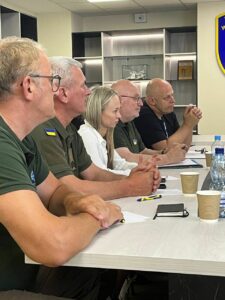 After travelling to Krakow (Poland) the EUROMIL delegation – composed of its President Emmanuel Jacob, Vice President Jörg Greiffendorf, and its Treasurer Ton de Zeeuw left Kraków via Przemyśl (close to the Ukrainian border), at almost midnight on 21 June 2023. With some delay, the delegation arrived in the second part of the morning in Kyiv where they were awaited by their Ukrainian friends.
After travelling to Krakow (Poland) the EUROMIL delegation – composed of its President Emmanuel Jacob, Vice President Jörg Greiffendorf, and its Treasurer Ton de Zeeuw left Kraków via Przemyśl (close to the Ukrainian border), at almost midnight on 21 June 2023. With some delay, the delegation arrived in the second part of the morning in Kyiv where they were awaited by their Ukrainian friends.
The agenda for the brief visit was well-prepared but loaded. After a short period to arrange some practical things, the delegation was brought to the newly reconstructed Union House of the Federation of Trade Unions of Ukraine, a spacious office building situated in the centre of Kyiv and our “centre of operations” during the visit.
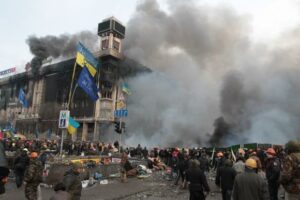 The building is located on the city’s main Khreshchatyk Street, with its façade facing the central Maidan Nezalezhnosti square. During the Euromaidan protest campaigns from late 2013 to early 2014, the Budynok Profspilok was occupied by protesters and turned into their main centre. Numerous significant Euromaidan events, including recurrent attacks and provocations by the police, occurred in and around the building. Tragically, on the night of 18–19 February 2014, the building was completely burnt down. The structure remained covered for a long time with large canvas screens bearing the words “Glory to Ukraine” in bold letters, concealing the extensive damage it had suffered. At the moment, the trade union movement has once again taken occupancy of the building.
The building is located on the city’s main Khreshchatyk Street, with its façade facing the central Maidan Nezalezhnosti square. During the Euromaidan protest campaigns from late 2013 to early 2014, the Budynok Profspilok was occupied by protesters and turned into their main centre. Numerous significant Euromaidan events, including recurrent attacks and provocations by the police, occurred in and around the building. Tragically, on the night of 18–19 February 2014, the building was completely burnt down. The structure remained covered for a long time with large canvas screens bearing the words “Glory to Ukraine” in bold letters, concealing the extensive damage it had suffered. At the moment, the trade union movement has once again taken occupancy of the building.
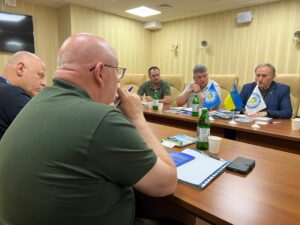 The working part of the visit started with a meeting in the House of Trade Unions with representatives of Ukrainian Union of Military and Security (UUMS). Both delegations exchanged information on several topics of mutual interest and agreed on the planning for upcoming discussions. In the second part of the afternoon, the delegation met with Yevgen Drapiatyi, the Vice President of the Federation of Trade Unions of Ukraine (FPU). Yevgen informed the EUROMIL delegation on the history of the Ukrainian trade union movement and their work throughout the past decades. From EUROMIL’s side, Emmanuel Jacob emphasized the importance of collaboration of soldiers, veterans, and all combatants. “Nowhere better than in Ukraine”, Jacob underlined, “society understands that these fellow citizens are real workers in uniform and should be embraced as such”. After further sharing information on national and international trade union cooperation, it was agreed to follow up on the situation of our Ukrainian “military” trade union movement. The meeting delved deeply into topics such as mental health support, training, and reintegration. To our delight, we were informed the following day that meetings were already scheduled within the week to come between our colleagues and the FPU, aiming to strengthen their national affiliation and cooperation.
The working part of the visit started with a meeting in the House of Trade Unions with representatives of Ukrainian Union of Military and Security (UUMS). Both delegations exchanged information on several topics of mutual interest and agreed on the planning for upcoming discussions. In the second part of the afternoon, the delegation met with Yevgen Drapiatyi, the Vice President of the Federation of Trade Unions of Ukraine (FPU). Yevgen informed the EUROMIL delegation on the history of the Ukrainian trade union movement and their work throughout the past decades. From EUROMIL’s side, Emmanuel Jacob emphasized the importance of collaboration of soldiers, veterans, and all combatants. “Nowhere better than in Ukraine”, Jacob underlined, “society understands that these fellow citizens are real workers in uniform and should be embraced as such”. After further sharing information on national and international trade union cooperation, it was agreed to follow up on the situation of our Ukrainian “military” trade union movement. The meeting delved deeply into topics such as mental health support, training, and reintegration. To our delight, we were informed the following day that meetings were already scheduled within the week to come between our colleagues and the FPU, aiming to strengthen their national affiliation and cooperation.
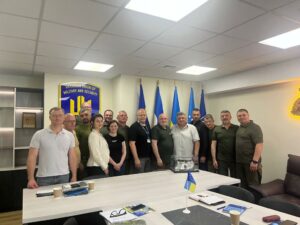 The rest of our first day of the visit was foreseen to meet and discuss with the Presidium members of the UUMS. As we delved into the challenges faced by Ukrainian soldiers and combatants, we noticed that some of these issues were similar to those experienced in other European armed forces, even in times of war. However, after more than a year of full-scale Russian invasion, and the fact that the number of combatants, military and civilians who joined the fight, the number of affected is enormously high. Moreover, it is unrealistic to expect a war-torn country with pressing needs for reconstruction to address all these issues alone and in the short term. Therefore, both delegations especially discussed the need of establishing enduring collaboration, support and expertise.
The rest of our first day of the visit was foreseen to meet and discuss with the Presidium members of the UUMS. As we delved into the challenges faced by Ukrainian soldiers and combatants, we noticed that some of these issues were similar to those experienced in other European armed forces, even in times of war. However, after more than a year of full-scale Russian invasion, and the fact that the number of combatants, military and civilians who joined the fight, the number of affected is enormously high. Moreover, it is unrealistic to expect a war-torn country with pressing needs for reconstruction to address all these issues alone and in the short term. Therefore, both delegations especially discussed the need of establishing enduring collaboration, support and expertise.
After closing the first day and having travelled by train the night before, a long night of sleep was much anticipated. Unfortunately, Russia had different plans, and at 1:30 a.m., we were compelled to leave our rooms and seek shelter in the hotel’s basement due to an Air Raid Alert.
The Air Raid Alert kept us there awake until 03h40 while the Ukrainian air defenses intercepted several missiles. Regrettably, the following night, as the EUROMIL delegation was once again on a night train towards Poland, Kyiv was hit once again. Falling debris struck an apartment building in the Solomainsky District causing a fire that left at least three people dead and eight others injured.
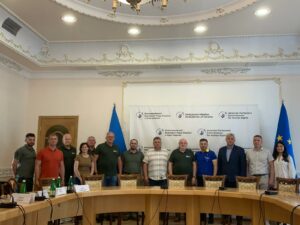 The first meeting, which took place on Friday 23 June, was planned with the Commissioner for Human Rights Dmytro Lubinets and his collaborators. Already earlier in the week, EUROMIL’s President discussed matters in Vienna, at the occasion of 15ICOAF, with the Representative of the Commissioner in the System of Bodies in Security and Defence Sector, Oleksandr Kononenko,. During the meeting in Kyiv, Commissioner Lubinets presented the structure of the Office and spoke about the institution’s activities. In particular, he emphasized that the Office of the Ombudsman protects the rights of military personnel and war veterans. After an extensive exchange of views and the conclusion of the meeting, the parties agreed on further communication and the possible organization of joint events.
The first meeting, which took place on Friday 23 June, was planned with the Commissioner for Human Rights Dmytro Lubinets and his collaborators. Already earlier in the week, EUROMIL’s President discussed matters in Vienna, at the occasion of 15ICOAF, with the Representative of the Commissioner in the System of Bodies in Security and Defence Sector, Oleksandr Kononenko,. During the meeting in Kyiv, Commissioner Lubinets presented the structure of the Office and spoke about the institution’s activities. In particular, he emphasized that the Office of the Ombudsman protects the rights of military personnel and war veterans. After an extensive exchange of views and the conclusion of the meeting, the parties agreed on further communication and the possible organization of joint events.
Unfortunately, the planned meeting with the State Secretary of the Ministry of Defense, Kostiantyn Vashchenko, had to be postponed due to the situation in Kyiv. Nonetheless, it seems that our visit had a positive outcome, as our Ukrainian friends from UUMS have been meanwhile called for a meeting with the Minister of Defence on short term to present and discuss the issues we had on the agenda.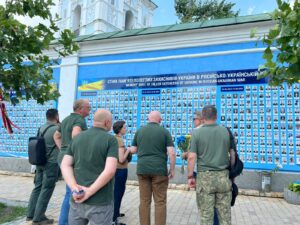
Despite the change in plans, the unexpected free time was put to good use. Both delegations visited the Wall of Remembrance of the Fallen for Ukraine, which is a part of the Mykhailivsky Golden-Domed Monastery in Kyiv. The memorial is dedicated to Ukrainian soldiers who lost their lives after 2014 and in 2020. The Wall of Remembrance was recently renovated and around 4500 new photos of fallen or disappeared combatants were added in 2020.
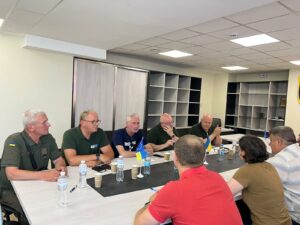 On the second and last day, EUROMIL proposed inviting Paul Niland, the founder and CEO of Lifeline Ukraine, to join the meeting. As already mentioned, EUROMIL’s President and Paul Niland had previously collaborated during a training session for the Lifeline’s volunteers in January 2020. Paul presented his organization’s work to the UUMS delegates, highlighting that Lifeline is no longer reachable only for veterans. They receive about 6000 calls per month on their hotline, and approximately 7% of these calls are from veterans, with an additional 7% coming from their relatives. But as emphasized by Paul, the demand is high and the pressure on his team is hard, especially in these challenging times in Ukraine.
On the second and last day, EUROMIL proposed inviting Paul Niland, the founder and CEO of Lifeline Ukraine, to join the meeting. As already mentioned, EUROMIL’s President and Paul Niland had previously collaborated during a training session for the Lifeline’s volunteers in January 2020. Paul presented his organization’s work to the UUMS delegates, highlighting that Lifeline is no longer reachable only for veterans. They receive about 6000 calls per month on their hotline, and approximately 7% of these calls are from veterans, with an additional 7% coming from their relatives. But as emphasized by Paul, the demand is high and the pressure on his team is hard, especially in these challenging times in Ukraine.
Last but not least, Natalia Kalmykova, Executive Director of the Ukrainian Veterans Foundation, presented the foundation’s plans for initiatives in Ukraine. The list of projects, going from a hotline for psychosocial support, through legal consultancy and social policy analysis, to financial support and reemployment policies, is very long and challenging. However, Natalia Kalmykova was clear and frank and stated that they need financial support as the resources from the government are limited due to the situation the country finds itself in. Additionally, they also need expertise to build up their agenda and platforms to exchange expertise and support. She emphasized that especially for the latter, she hopes to count on EUROMIL’s expertise and network, and some first points of action have been agreed on before closing the meeting.
Concluding this 36-hour visit, both partners agreed this turned out as an extremely fruitful initiative. The date for a first formal discussion in Kyiv on concrete collaboration with the trade union federation FPU has been set, as well as with the Minister of Defence. With several of the other partners that joined us during these days, some concrete agreements have been set. To conclude, EUROMIL and UUMS agreed on some concrete points of action for the next weeks. EUROMIL’s Ukrainian partners are looking for expertise from EUROMIL’s members and under the specific circumstances, we will, in common agreement, find workable initiatives for mutual support.
EUROMIL’s President thanked the Ukraine organizers for this visit and their support. He emphasized that “Europe and other international partners must continue to support military support to Ukraine because this is needed to defend Ukraine and its citizens, but also to defend Europe and our common European values and democracy.” “Furthermore” he added, “we must also invest already now in support of Ukraine’s future and the well-being of its citizens, combatants included. We owe this to Ukraine, and we owe it to the men and women that are fighting for their country and Europe’s freedom and democracy.”
Slava Ukraini!


